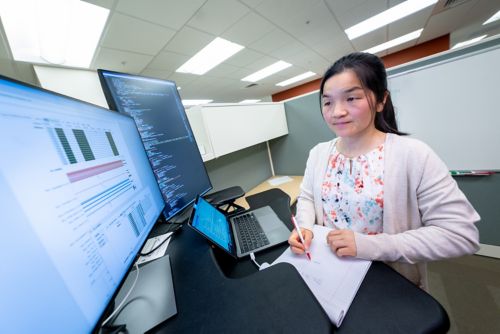St. Jude Family of Websites
Explore our cutting edge research, world-class patient care, career opportunities and more.
St. Jude Children's Research Hospital Home

- Fundraising
St. Jude Family of Websites
Explore our cutting edge research, world-class patient care, career opportunities and more.
St. Jude Children's Research Hospital Home

- Fundraising
Ma Lab
Interrogating cancer genetics, dissecting tumor heterogeneity, and evaluating cancer early detection through mathematical modeling
About the Ma Lab
Cancer presents a paramount health challenge—one that requires novel insights and new technologies to address. With nearly a decade’s dedication to the study of genetic underpinnings of childhood cancers, our lab is equipped with the knowledge and tools to further our mechanistic understandings of human cancers. Our lab partners with expert experimentalists and physician-scientists to discover novel patterns, generate testable hypotheses, and validate them in patient data and cell models.

Our research summary
Our lab currently has four active research areas all aimed at furthering our understandings on the genetic underpinnings of childhood cancers. 1) Cancer genetics, etiology, and editing-based therapeutics. Through close collaboration with physician-scientists, we study the somatic and germline alterations across large cohort of patient tumors to define cancer drivers. By investigating the etiology of these drivers, we hope to develop novel vulnerabilities for genome-editing based therapeutics. 2) Mathematical modeling of intra-tumor heterogeneity. The challenge of cancer management is resistance to treatment, which has been shown to stem in intra-tumor heterogeneity. Therefore, our lab is particularly interested in understanding intra-tumor heterogeneity and its relationship to treatment responses. Discoveries from such investigation can lead to novel therapeutic strategies to improve cure rate. 3) Cancer early detection and monitoring. Early-stage cancers are known to have much higher cure rate than late-stage cancers. With extensive knowledges in the genetics of “terminal” stages of childhood cancers, we hope to develop sensitive assays to accurately detect and forecast cancers before overt symptoms to enable early intervention. We use relapsed leukemia as a model system for this direction. 4) Cell line and PDX models. To validate and test the discoveries made from patient specimens, we are currently characterizing the genetics of large collection of cell models, which can also serve as an invaluable resource for the research community. Our work is highly interdisciplinary, leveraging expertise and insights from investigators across the institution including Dr. Mignon Loh (ALL), Dr. Soheil Meshinchi (AML), and Dr. Jeff Klco (AML). We also partner with the Genomics Laboratory in Computational Biology and the Center for Advanced Genome Engineering.
Learn more
Visualization and analysis tools break down barriers for big data
St. Jude is at the forefront of creating tools to visualize and analyze genomic data.
Publications
Contact us
Xiaotu Ma, PhD
Associate Member, Computational Biology
Department of Computational Biology
MS 1135, Room IA6049
St. Jude Children's Research Hospital

Memphis, TN, 38105-3678 USA GET DIRECTIONS

